ふくしま集団疎開裁判の
ブログに
次のような記事が載ってました。
「今、疎開裁判は世界の関心事。
世界主要メディアは、いっせいに疎開裁判の判決を報じました」と。
☆ 記事URL:http://fukusima-sokai.blogspot.jp/
日本では、
朝日新聞(英語版、資料-1)だけ、
辛うじて報道があったそうです。
ただし、AP通信(資料-2)の逆輸入報道です。
一部上げますと、
世界主要メディアの報道は、
次の通りです。
ニューヨークタイムズ
ワシントンポスト
ABCニュース (米国三大テレビ局の1つ)
FOXニュース
■資料-1
「Japan court rejects demand to evacuate Fukushima children」
The Asahi Shimbun(April 25, 2013)
☆ 記事URL:http://ajw.asahi.com/article/0311disaster/fukushima/AJ201304250125
THE ASSOCIATED PRESS
A Japanese court has rejected a demand that a city affected by the fallout of the country's 2011 nuclear disaster evacuate its children.
The unusual lawsuit was filed on behalf of the children by their parents and anti-nuclear activists in June 2011. The Sendai High Court handed down its ruling on April 24.
The case had drawn international attention because it touched the uncertainties about the effects of continuous low-dose radiation on health, especially that of children, who are far more vulnerable than adults.
The lawsuit argued the city of Koriyama had legal responsibility to evacuate children at elementary schools and junior-high schools, which are part of compulsory education under Japanese law.
The court acknowledged radiation in the city exceeded levels deemed safe prior to the disaster. But it said the government shoulders no responsibility for evacuating the schools as demanded--in effect, telling people to leave on their own if they were worried.
Toshio Yanagihara, one of the lawyers, said the ruling was unfair as the children were "victims with absolutely no responsibility for the nuclear accident."
A lower court threw out the original case in December 2011, but that ruling was appealed. The latest ruling can also be appealed.
Koriyama is a city of 330,000 people located about 60 kilometers (40 miles) west of the Fukushima No. 1 nuclear plant, which went into multiple meltdowns more than two years ago after a giant tsunami destroyed it cooling system. That set off the worst nuclear catastrophe since Chernobyl.
Thousands of children got cancer after the Chernobyl disaster, but the cases did not surface for several years.
It is unclear whether Fukushima children are equally prone, as cancer has various causes, and radiation affects people differently. Radioactive contamination is complex, tainting not only the air but also getting in the food, soil and water.
Some experts say radiation outside the restricted zone right around the Fukushima plant is so low the probability of getting cancer is no different from the rest of Japan. But many Fukushima residents are worried and have moved out.
The government's handling of the Fukushima disaster has led to widespread public distrust. Thousands of people have taken to the streets, demanding a phase-out of atomic power. The government has expressed a desire to restart reactors after checking on their safety.
THE ASSOCIATED PRESS
■資料-2
「Japan court rejects demand to evacuate children」
By YURI KAGEYAMA
AP Business Writer / April 25, 2013
☆ 記事URL:http://www.boston.com/news/world/asia/2013/04/25/japan-court-rejects-demand-evacuate-children/JXDTIYWtJFzUakZVyJGyRI/story.html

FILE - In this April 16, 2011 file photo, Wakana Nemoto, 3, standing next to her mother Naoko, receives a radiation exposure screening outside an evacuation center in Fukushima, northeastern Japan. A Japanese court has rejected a demand that a city affected by the fallout of the country's 2011 nuclear disaster evacuate its children. The unusual lawsuit was filed on behalf of the children by their parents and anti-nuclear activists in June 2011. The Sendai High Court handed down its ruling Wednesday, April 24, 2013. (AP Photo/Hiro Komae, File)
TOKYO (AP) — A Japanese court has rejected a demand that a city affected by the fallout of the country’s 2011 nuclear disaster evacuate its children.
The unusual lawsuit was filed on behalf of the children by their parents and anti-nuclear activists in June 2011. The Sendai High Court handed down its ruling Wednesday.
The case had drawn international attention because it touched the uncertainties about the effects of continuous low-dose radiation on health, especially that of children, who are far more vulnerable than adults.
The lawsuit argued the city of Koriyama had legal responsibility to evacuate children at elementary schools and junior-high schools, which are part of compulsory education under Japanese law.
The court acknowledged radiation in the city exceeded levels deemed safe prior to the disaster. But it said the government shoulders no responsibility for evacuating the schools as demanded — in effect, telling people to leave on their own if they were worried.
Toshio Yanagihara, one of the lawyers, said the ruling was unfair as the children were ‘‘victims with absolutely no responsibility for the nuclear accident.’’
A lower court threw out the original case in December 2011, but that ruling was appealed. The latest ruling can also be appealed.
Koriyama is a city of 330,000 people located about 60 kilometers (40 miles) west of the Fukushima Dai-ichi nuclear plant, which went into multiple meltdowns more than two years ago after a giant tsunami destroyed it cooling system. That set off the worst nuclear catastrophe since Chernobyl.
Thousands of children got cancer after the Chernobyl disaster, but the cases did not surface for several years.
It is unclear whether Fukushima children are equally prone, as cancer has various causes, and radiation affects people differently. Radioactive contamination is complex, tainting not only the air but also getting in the food, soil and water.
Some experts say radiation outside the restricted zone right around Fukushima Dai-ichi is so low the probability of getting cancer is no different from the rest of Japan. But many Fukushima residents are worried and have moved out.
The government’s handling of the Fukushima disaster has led to widespread public distrust. Thousands of people have taken to the streets, demanding a phase-out of atomic power. The government has expressed a desire to restart reactors after checking on their safety.
ブログに
次のような記事が載ってました。
「今、疎開裁判は世界の関心事。
世界主要メディアは、いっせいに疎開裁判の判決を報じました」と。
☆ 記事URL:http://fukusima-sokai.blogspot.jp/
日本では、
朝日新聞(英語版、資料-1)だけ、
辛うじて報道があったそうです。
ただし、AP通信(資料-2)の逆輸入報道です。
一部上げますと、
世界主要メディアの報道は、
次の通りです。
ニューヨークタイムズ
ワシントンポスト
ABCニュース (米国三大テレビ局の1つ)
FOXニュース
■資料-1
「Japan court rejects demand to evacuate Fukushima children」
The Asahi Shimbun(April 25, 2013)
☆ 記事URL:http://ajw.asahi.com/article/0311disaster/fukushima/AJ201304250125
THE ASSOCIATED PRESS
A Japanese court has rejected a demand that a city affected by the fallout of the country's 2011 nuclear disaster evacuate its children.
The unusual lawsuit was filed on behalf of the children by their parents and anti-nuclear activists in June 2011. The Sendai High Court handed down its ruling on April 24.
The case had drawn international attention because it touched the uncertainties about the effects of continuous low-dose radiation on health, especially that of children, who are far more vulnerable than adults.
The lawsuit argued the city of Koriyama had legal responsibility to evacuate children at elementary schools and junior-high schools, which are part of compulsory education under Japanese law.
The court acknowledged radiation in the city exceeded levels deemed safe prior to the disaster. But it said the government shoulders no responsibility for evacuating the schools as demanded--in effect, telling people to leave on their own if they were worried.
Toshio Yanagihara, one of the lawyers, said the ruling was unfair as the children were "victims with absolutely no responsibility for the nuclear accident."
A lower court threw out the original case in December 2011, but that ruling was appealed. The latest ruling can also be appealed.
Koriyama is a city of 330,000 people located about 60 kilometers (40 miles) west of the Fukushima No. 1 nuclear plant, which went into multiple meltdowns more than two years ago after a giant tsunami destroyed it cooling system. That set off the worst nuclear catastrophe since Chernobyl.
Thousands of children got cancer after the Chernobyl disaster, but the cases did not surface for several years.
It is unclear whether Fukushima children are equally prone, as cancer has various causes, and radiation affects people differently. Radioactive contamination is complex, tainting not only the air but also getting in the food, soil and water.
Some experts say radiation outside the restricted zone right around the Fukushima plant is so low the probability of getting cancer is no different from the rest of Japan. But many Fukushima residents are worried and have moved out.
The government's handling of the Fukushima disaster has led to widespread public distrust. Thousands of people have taken to the streets, demanding a phase-out of atomic power. The government has expressed a desire to restart reactors after checking on their safety.
THE ASSOCIATED PRESS
■資料-2
「Japan court rejects demand to evacuate children」
By YURI KAGEYAMA
AP Business Writer / April 25, 2013
☆ 記事URL:http://www.boston.com/news/world/asia/2013/04/25/japan-court-rejects-demand-evacuate-children/JXDTIYWtJFzUakZVyJGyRI/story.html

FILE - In this April 16, 2011 file photo, Wakana Nemoto, 3, standing next to her mother Naoko, receives a radiation exposure screening outside an evacuation center in Fukushima, northeastern Japan. A Japanese court has rejected a demand that a city affected by the fallout of the country's 2011 nuclear disaster evacuate its children. The unusual lawsuit was filed on behalf of the children by their parents and anti-nuclear activists in June 2011. The Sendai High Court handed down its ruling Wednesday, April 24, 2013. (AP Photo/Hiro Komae, File)
TOKYO (AP) — A Japanese court has rejected a demand that a city affected by the fallout of the country’s 2011 nuclear disaster evacuate its children.
The unusual lawsuit was filed on behalf of the children by their parents and anti-nuclear activists in June 2011. The Sendai High Court handed down its ruling Wednesday.
The case had drawn international attention because it touched the uncertainties about the effects of continuous low-dose radiation on health, especially that of children, who are far more vulnerable than adults.
The lawsuit argued the city of Koriyama had legal responsibility to evacuate children at elementary schools and junior-high schools, which are part of compulsory education under Japanese law.
The court acknowledged radiation in the city exceeded levels deemed safe prior to the disaster. But it said the government shoulders no responsibility for evacuating the schools as demanded — in effect, telling people to leave on their own if they were worried.
Toshio Yanagihara, one of the lawyers, said the ruling was unfair as the children were ‘‘victims with absolutely no responsibility for the nuclear accident.’’
A lower court threw out the original case in December 2011, but that ruling was appealed. The latest ruling can also be appealed.
Koriyama is a city of 330,000 people located about 60 kilometers (40 miles) west of the Fukushima Dai-ichi nuclear plant, which went into multiple meltdowns more than two years ago after a giant tsunami destroyed it cooling system. That set off the worst nuclear catastrophe since Chernobyl.
Thousands of children got cancer after the Chernobyl disaster, but the cases did not surface for several years.
It is unclear whether Fukushima children are equally prone, as cancer has various causes, and radiation affects people differently. Radioactive contamination is complex, tainting not only the air but also getting in the food, soil and water.
Some experts say radiation outside the restricted zone right around Fukushima Dai-ichi is so low the probability of getting cancer is no different from the rest of Japan. But many Fukushima residents are worried and have moved out.
The government’s handling of the Fukushima disaster has led to widespread public distrust. Thousands of people have taken to the streets, demanding a phase-out of atomic power. The government has expressed a desire to restart reactors after checking on their safety.










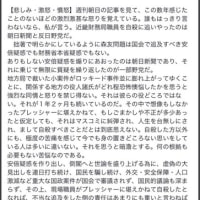
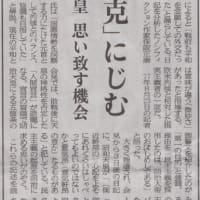
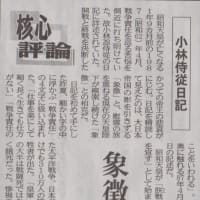
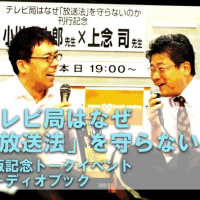

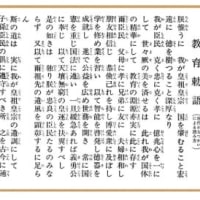


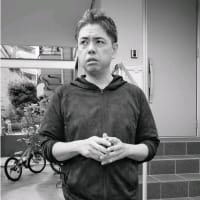
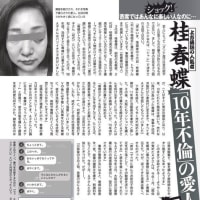
※コメント投稿者のブログIDはブログ作成者のみに通知されます